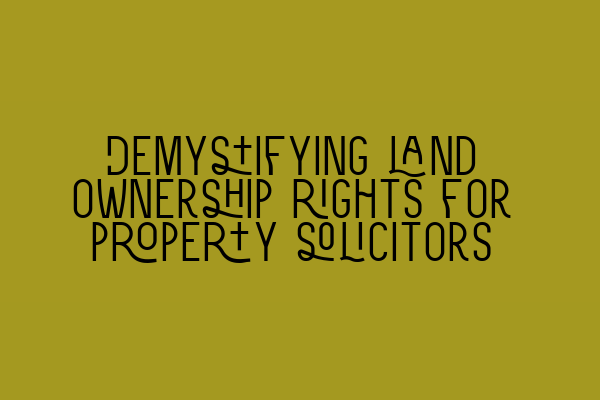Demystifying Land Ownership Rights for Property Solicitors
As property solicitors, it is essential to have a deep understanding of land ownership rights. This knowledge forms the foundation of all property transactions, allowing you to navigate the complexities of property law and provide expert advice to your clients. In this blog post, we will demystify land ownership rights, clarifying key concepts and providing you with valuable insights.
Overview of Land Ownership Rights
Land ownership rights refer to the legal rights and interests an individual or entity holds over a specific parcel of land. These rights grant the owner certain powers, limitations, and responsibilities regarding the land. Understanding land ownership rights is crucial in determining who has the authority to use, possess, and transfer the land, as well as the limitations and obligations that come with ownership.
Types of Land Ownership
There are several types of land ownership, each with its own characteristics and legal implications. The most common forms of land ownership include:
- Freehold Ownership: This type of ownership grants the owner absolute and indefinite rights over the land. The owner has the authority to use, possess, and transfer the land without any restrictions, subject to legal requirements and planning regulations.
- Leasehold Ownership: Leasehold ownership involves the ownership of a property for a fixed period, typically granted through a lease agreement. The leaseholder has the right to use and possess the property during the lease term, but the ultimate ownership remains with the freeholder.
- Commonhold Ownership: Commonhold ownership is a relatively new form of ownership in which individuals own a freehold interest in a unit within a building or development. It combines elements of freehold and leasehold ownership.
- Joint Ownership: Joint ownership occurs when two or more individuals own a property together. This can be as joint tenants, where each party has an equal share and right of survivorship, or as tenants in common, where each party has a distinct share and can transfer it separately.
Understanding Land Tenure
Land tenure refers to the relationship between individuals or entities and the land they occupy or own. It establishes the rights and obligations associated with land ownership. Common forms of land tenure include:
- Freehold Tenure: Freehold tenure provides the most extensive ownership rights, allowing the owner to possess the land indefinitely. Freehold tenure is often associated with freehold ownership.
- Leasehold Tenure: Leasehold tenure grants the occupier the right to possess and use the land for a fixed period, as specified in the lease agreement. Leasehold tenure is commonly associated with leasehold ownership.
- Commonhold Tenure: Commonhold tenure is associated with commonhold ownership, providing individuals with a freehold interest in a unit within a building or development.
Key Considerations for Property Solicitors
Property solicitors play a crucial role in advising clients on land ownership rights. Here are some key considerations for property solicitors:
- Legal Due Diligence: Conduct thorough due diligence to verify the ownership rights and any associated limitations or obligations.
- Land Registration: Understand the land registration process and ensure all necessary registrations and searches are conducted.
- Property Transfers: Facilitate smooth property transfers by ensuring proper documentation and compliance with legal requirements.
- Lease Agreements: Draft and review lease agreements, clarifying the rights and responsibilities of both the lessor and lessee.
By staying up-to-date with the latest developments in land ownership rights, property solicitors can provide expert advice and guide their clients through various property transactions, from acquisitions and disposals to landlord-tenant relationships.
At SQE Property Law & Land Law, we offer comprehensive preparation courses for aspiring solicitors. Our carefully designed courses cover all aspects of property law and land law, including land ownership rights. Whether you are preparing for the SQE 1 or SQE 2 exams, our courses will equip you with the knowledge and skills necessary to succeed.
Expand your knowledge and boost your career prospects with our SQE 1 Practice Exam Questions and SQE 1 Practice Mocks FLK1 FLK2. Prepare yourself for the SQE exams with our comprehensive SQE 2 Preparation Courses and SQE 1 Preparation Courses. Stay updated on important dates by checking the SRA SQE Exam Dates regularly.
